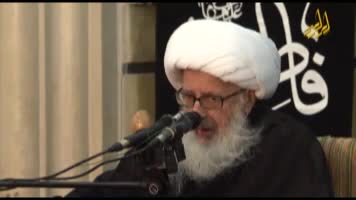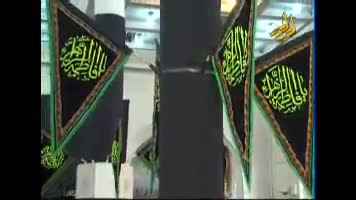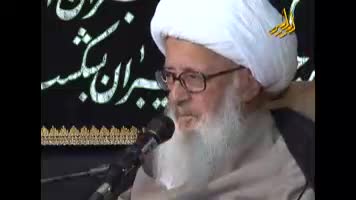Khidr remarked: "There is something underneath the hoofs of this horse that
whoever picks it up becomes remorseful later on, and whoever refrains from picking it up will also be regretful".
One group declared: "If remorse is the end result (of both actions),
The Day of Judgement (Qiyamah) has 28 names within the Holy Quran
One of these names is Yaum-ul-Hasrah, "The Day of Intense Regret"
The Quranic verse is this:
"And warn them of the day of intense regret, when the matter shall have been decided…" (Maryam:39)
From our point of view, this verse, in itself, is enough.
If one comprehends whom the verse addresses:
(It addresses) the Last Prophet, and it does so in terms of a warning.
This warning is related to the "Day of Intense Regret".
And God says: Now the matter has been decided (It is sealed and unchangeable).
We were ignorant and have made mistakes which,
if God bestows upon us the ability, we might be able to compensate.
When the Prophet Khidr, alongside Alexander, reached the darkness,
Khidr remarked: "There is something underneath the hoofs of this horse that
whoever picks it up becomes remorseful later on, and whoever refrains from picking it up will also be regretful".
One group declared: "If remorse is the end result (of both actions),
then why should we bother ourselves with dismounting".
However, another group stepped down and picked up (the things in question).
When the darkness subsided, they gazed upon that which they had picked up and saw that they were emeralds.
Those who had picked up (some of these stone) became regretful because they had picked up so few,
(with intense regret) they wished that they had picked up atleast one more piece.
As for those who had not picked up any, their remorse was even more intense.
This is the reality of (the verse) "And warn them of the day of intense regret…"
Within this world there exists darkness…
Truly the Holy Quran is astonishing.
"Allah is the guardian of those who believe. He brings them out of the darkness into the light…" (Al-Baqara:257)
Precious gems are hidden within this darkness,
On the day of judgement, those who picked up (some of these gemstones) will regret as to why they picked up so few,
As for those who failed completely in utilizing this opportunity,
they shall be in such a state of remorse and regret that is utterly indescribable,
because (at that point) there shall exist no possibilty of compensation.
For example, with regards to the martyrdom of Hazrat Zahra (A.S.), we could have rendered an additional community mournful (if we had tried) but we did not.
The regret of this failure shall accompany us eternally,
because last year's martyrdom anniversary can never return.
If mourning had taken place in that (additional) location, even in that (additional) village,
the name and memory of Hazrat Zahra (A.S.) would have been revived, this would have been the result.
The sixth Imam has a saying (relevant to this discussion).
A comprehensive understanding and appreciation of such words requires the juristic intellect of a jurisprudent like Sheikh-e-Ansari,
The saying is this:
"God bestowed His mercy on him who revived our matter"
This statement of the Imam is a solution for the problem facing us on the "Day of Intense Regret".
Firstly, the prayer is in the past tense,
it says: "God bestowed His mercy", not that "God shall bestow His mercy"
and this, in itself, is a lengthy discussion.
How grave is the difference between an "actualized" relationship (that characterizes past tense verbs) and an "anticipatory" relationship (that characterizes present tense verbs)? ,
it is a sophisticated academic discussion.
Furthermore, this prayer belongs to an Imam, and the very first sign of an Imam is that (he fits the criterion mentioned in this statement):
"Surely, the Imam is recognized through his knowledge and the fulfillment of his prayers",
thus, his prayers are never rejected.
Keeping this in mind, the prayer in question is as such:
"God bestowed His mercy", not "God shall bestow His mercy"
"God bestowed His mercy on him who revived our matter"
So what is this revival? And what is this mercy?
Firstly, it is a mercy requested and desired by the Imam.
Once again we must refer to the Holy Quran.
The Quran's text is this:
"and the mercy of your Lord is better than what they amass" (Az-Zukhruf:32)
That which all of humanity shall amass, from the beginning of creation to the end of time,
will not even be equal to one act of divine mercy.
This is the mercy requested and desired by the Imam for someone who revives their matter.
Indeed, this is what we have forgone and lost uptil now.
Years upon years went by but nothing was done with regards to the martyrdom anniversary of Hazrat Zahra (A.S.)
What great works could have been carried out, but we lost the opportunity.
Now we must remain alert so that we are able to utilize every chance we get to the utmost of its potential.
"God bestowed His mercy on him who revived our matter"
In this manner, the intense regret (that we spoke of earlier) will be compensated, because all that exists, exists here and now.
That group, which represents the reason behind creation,
is a group of individuals who completely dissolved themselves in God,
i.e. they eradicated their own will vis-à-vis the will of God.
"And they give food out of love for Him to the poor and the orphan and the captive:
We only feed you for Allah's sake" (Al-Insaan:8-9)
This is a sample of their works.
At that time their entire existence becomes absorbed into God's will
It is then that God's will (as personified by the contents of this verse) "Verily, when He intends a thing,
His Command is, "be", and it is!",
His will and intention becomes the same as theirs.
There is a pilgrimage supplication about which Sheikh Sadooq comments:
It is the most authentic of all pilgrimage supplications.
This (high degree of veracity and authenticity) is something completely understood by jurists alone.
The Sheikh, within the book "Man la Yahzur",
selects this particular pilgrimage supplication from amongst all others and deems it to be the most authentic.
Keeping this in mind, the text of this supplication is as such:
"The will of God with regards to the quantity of your matter (your sustenance),
descends upon you and emanates from within your homes"
Therefore, he who toils in order to obtain these things, his toil is not comendable at all.
But we are veiled (and live within a state of ignorance), understanding nothing.
This is because the above meaning is a product of our comprehension.
Firstly, we must recognize who we work for.
For example, mid-Shabaan is upon us,
What is mid-Shabaan? What occurred therein?
Who is the master of this day? (About these questions) the intellects is rendered utterly flabbergasted.
The Imam-e-Zamaan is beyond explanation.
I, myself, am struck with astonishment when I come across this issue.
Sunni and Shi'a (have both narrated such facts) … and it is from amongst the extraordinary wonders.
If God wills, I shall elaborate upon this tradition at some other time.
The tradition, itself, is this:
"His companions are equal to the companions at Badr,
each one of them bears a sword".
Pay great attention to these words.
If the servant is of such a status, than what would be the standing of his master?
"…each one of them bears a sword,
upon the blade of that sword are inscribed a thousand words,
every single one of these words opens up a thousand gates of knowledge".
This is the status of the companions of Imam-e-Zamaan,
after this, we come across a sentence that astounds the mind:
"The first ones have not outdone them, nor shall the last ones attain a status equal to them".
These 313 individuals enjoy a status unmatched by any of the "first ones",
What does (the tradition) mean by the phrase "the first ones"?
All the saints of God from the past, and all His saints to the very end (of time).
From the beginning to the end, all the saints of God put together are still unable to match the status of these 313 individuals.
This is the status of his companions, so what must his own standing be equal to? What must his own status be like?
The issue of Imam-e-Zamaan leaves the mind astonished.
If the people understood, the night of mid-Shabaan would have seen the whole nation drowning (in its greatness).
Never in history did such an occurrence take place.
When the Prophet (P.B.U.H.) introduces him, he uses these words:
"Al-Mahdi is from amongst my children".
Then come two sentences that dazzle the mind:
"His name is my name, and his title is my title".
The name and the title of the Seal of the Prophets (P.B.U.H.) is not permissible for anyone else.
It is an exclusive privilige of Hujjat ibn Al-Hasan (Imam-e-Zamaan).
His name is the name of the Seal of the Prophets (P.B.U.H.), and his title is the title of the Seal of the Prophets (P.B.U.H.).
The sentence that baffles the likes of Sheikh Ansari is this:
"(He) bears the most resemblance to me in terms of physical appearance and moral character"
All who have a soul, also possess a body,
The best in body and the best in soul is the first person of existence,
and that person is the Seal of the Prophet (P.B.U.H.)
Then he, himself, remarks: "(He) bears the most resemblance (to me)…"
bearing the most resemblance to me from amongst all of mankind,
from the standpoint of bodily appearance, and also from the standpoint of spiritual perfection,
(no one) bears more resemblance to me than Mahdi.
This is why a description of Imam-e-Zamaan is beyond imagination.
The people put up lights on the night of mid-Shabaan, but who is the true owner of this night?
Sheikh Toosi narrates a prayers for the night of mid-Shabaan in the book "Misbah-ul-Mutahajjid":
(This prayer) astonishes the mind of every philosopher and jurisprudent.
It describes Imam-e-Zamaan using just two phrases:
"Your light bears all-encompassing radiance, and your luminescence is clear and manifest (like that of the full moon)"
Imam-e-Zamaan is the light of God, but a light that has all-encompassing radiance,
Imam-e-Zamaan is the luminescence of God, but a luminescence that is clear and manifest.
This is the utterance of God's chosen saint, an utterance narrated by Sheikh-ut-Taifa Sheikh Toosi in the book "Misbah-ul-Mutahajjid"
This is Imam-e-Zamaan.
All of you have read the Quranic chapter Ash-Shams:
" I swear by the sun and its brilliance,
And the moon when it follows the sun,
And the day when it shows it". (Ash-Shams:1-3)
Three phrases one after the other,
The sun is interpreted as the Seal of the Prophets (P.B.U.H.)
The moon is the Commander of the Faithful (A.S.),
The day is Hujjat ibn Al-Hasan. "And the day when it shows it"
All of you must decide to propogate this issue:
Start with reciting the whole Quran every month without exception,
then gift the reward of this recitation to Imam-e-Zamaan.
Later on you shall find out what the results of this action were?
These (actions) are all red elixirs, but (unfortunately) we came to our senses when it was already too late.
A few years ago I came across this tradition,
a tradition that is so authentic that the jurist,
when we say "the jurist" we do not mean just anybody,
in fact,w e mean to speak of Sheikh Ansari, Mirza Shirazi, Shaheed Awal, Shaheed Thani
The tradition we came across dazzles the mind. Its result is this:
He who acts in accordance to this
i.e. he who reads the Quran as much as he can, and then gifts it to him,
the absolute result of such an action (which is beyond comparison) is that this reader shall be made to accompany him
The very reward of such an act is accompaniment.
Paradise is no longer in question, infact it no longer holds any value.
A person whose action is this:
He reads the Quran as much as possible and gifts it to Imam-e-Zamaan,
his reward is that he accompanies him in this world and the hereafter.
What does it mean if one accompanies him? Accompaniment with Imam-e-Zamaan…
Imam-e-Zamaan is he who:
"Whoever wishes to see Adam and Sheeth, (then know) that I am Adam and I am Sheeth"
Once he reappears, he will declare:
Whoever wishes to see Adam and Sheeth,
I am Adam, I am Sheeth,
I am Nuh, I am Saam,
I am Ibrahim, I am Ismaael,
I am Musa, I am Haroon,
I am Isa, I am Shamoon,
up until the point that we reach this sentence:
"He who seeks to gaze upon Muhammad (P.B.U.H.) and Ali (A.S.), then I am Muhammad (P.B.U.H.) and I am Ali (A.S.)"
Imam-e-Zamaan is the essence of all the prophets and all their heirs
Service to him, and working for him,
propogating his virtues, publicizing his merits,
reviving his matter, that too in the time of his occultation,
this is the gemstone that shall cause intense regret on the Day of Judgement.
We could have taken one more step in service of him, but we did not.
Nevertheless, we hope that since now God has chosen to write your names into this register,
(and) indeed His choice is not without reason
but is a result of the chaste earnings of your fathers and the pure nourishment provided to you by your mothers,
or that he has chosen you as a result of some virtuous act performed by you,
since not everyone's name can find its way into the register of Siddeeqa-e-Kubra
and for such a night, that in it the Commander of the Faithful yearned for death; that day, that night is revived.
This is a level that is beyond explanation. It is divine grace.
Try to keep your name within this register, and work (for it),
and involve others into this task.
Since these activities require a lot of effort, and this number of people is very little.
All sincere and wise individuals, who comprehend the gravity of this task, should be absorbed into this work.
the higher the degree of excellence in the accomplishment of this task,
the result of such an accomplishment will be seen in two places, two places for sure:
The first instance is at the time of death.
"Piles up upon them the pain of death and the regret of cessation"
It is at that time that without doubt (this sentence comes to life):
"O' the hardship of the dying soul! He who dies, sees me"
Anyone who dies, sees me. There is no exception.
At that moment, the Commander of the Faithful comes to beside your pillow
then he looks and sees:
that your are the same person as the one who toiled in the service of his broken ribbed wife.
Here, the angel Izraeel will no longer remain with you.
The second instance is on the Day of Judgement, a day that the prophets (unanimously declare to be extremely tough and, therefore,) cry out: O' my soul!
Suddenly (on that day) she (Hazrat Fatima Zahra) comes forward, and places a blood drenched shirt on top of her head,
then she says: "O' Lord! My followers"
Jibraeel descends and says:
"O' servant of God! God sends His salutations upon you, and says:
Ask from me whatever your heart desires, and today I shall bestow it upon you"
The tradition says: "She shall collect her followers and servants
like a hen collects pieces of grain (sparing not even a single piece)".
This is the reward of your actions.
In summary, you must understand the worth of this blessing . Do not get tired while walking this path. Try your utmost …
"there afflicts them not thirst or fatigue or hunger in Allah's way" (At-Tawba:120)
What is "Allah's way"? In is mentioned in the Ziarat-e-Jamea:
"You (the Prophet's sacred family) are the greatest way and the steadfast path"
This is your action.
" but a good work is written down to them" (At-Tawba:120)
This is your reward.



